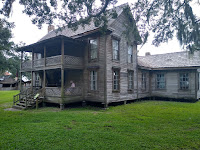Do you know how the phrases Florida Cracker or Georgia Cracker came into being? The phrases refer to early Georgia and Florida pioneers who started rounding up and herding the cattle that were descended from the first cattle brought to North America by the Spaniards in the 1500s and 1600s. Over time, some cattle escaped or were abandoned, and they bore many generations of feral cattle. When white settlers moved into Georgia and Florida, they re-domesticated the cattle. By the 1800s, these men were called cow hunters, because they had to venture into unsettled land to catch the cattle. They were also called Crackers because of the sound made by one of their most often used herding tools, the bullwhip.
Today, at the Florida State Fairgrounds in Tampa, there is a great living history experience called Cracker Country. ( http://www.crackercountry.org/ ) Cracker Country is a rural Florida living history museum, founded with the purpose of preserving Florida's rural heritage. Its mission, first and foremost is education, so it is not open to public everyday. During the normal school year, it is open for school field trips and for homeschoolers, and it is open to the public for the duration of the Florida State Fair in February. There are also a few weekend and evening programs that are open to the general public during the year.
Like other historic villages, structures have been moved to Cracker Country from all over Florida, including a train depot, a school, a church, a couple of farm houses, and the childhood home of a former Florida governor. Docents and living history interpreters are on hand to tell the history of each structure and to answer questions. You can watch as interpreters work metal in the blacksmith shop, weave, make candles, make butter, wash laundry, or perform other activities of farm life in rural 1890s Florida.
Every day, more and more people move to Florida, many from urban areas in the North. Cracker Country is more necessary every day to ensure that this important part of Florida history is not forgotten.












No comments:
Post a Comment